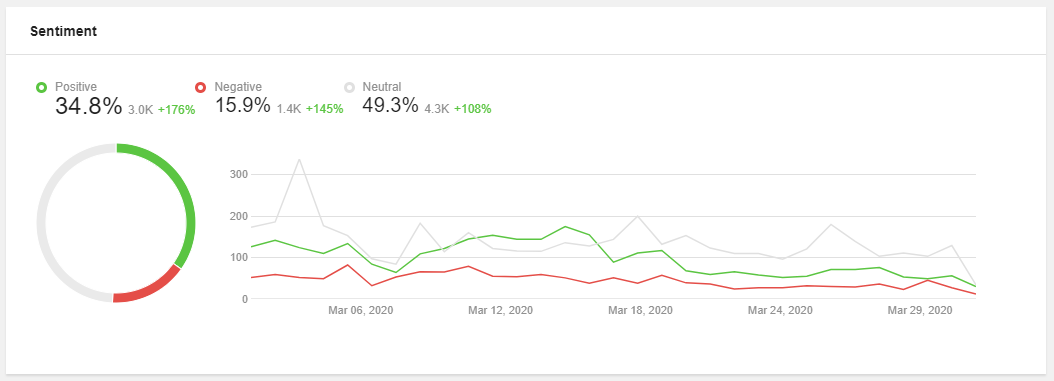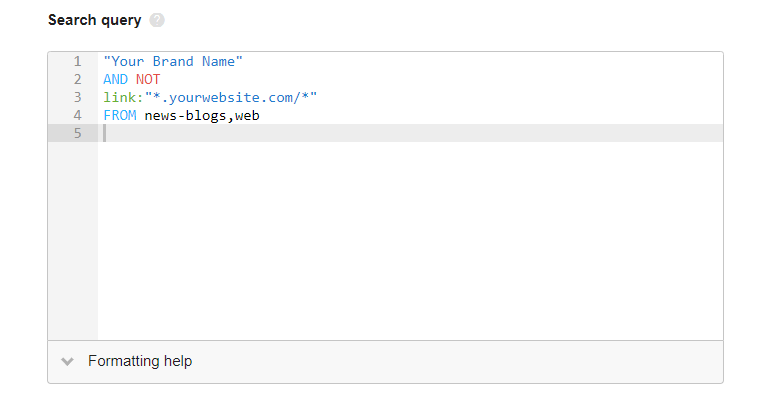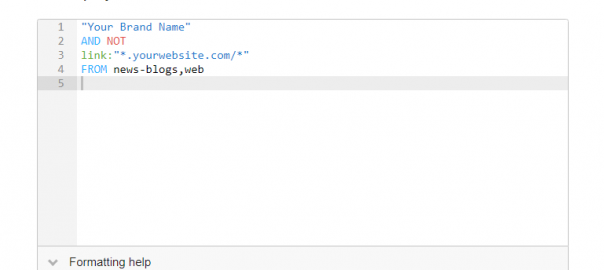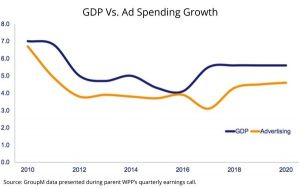To discover all ways in which you can use social listening to affect your ranking, we first have to clear up the meaning behind social listening.
What is social listening?
Social listening is the technology that lets the companies monitor social media platforms and other online sources for conversations related to their brands.
The workflow is very straightforward: you create an alert for your brand name or any other keyword (product, competitor, CEO, social media campaign, etc.) and a social listening tool tracks social media platforms, blogs, forums, news sites, and the rest of the Internet to spot and return the mentions of given keywords. Then the tool analyzes this data to reveal the brand’s reputation, popularity, demographics, locations, languages, popular topics, and so on. The number of sources and the richness of the analysis depends on the tool.
Despite the common belief, social listening doesn’t cover social media only. It covers the overall online presence of a brand which includes social media. And that’s what search engines care about a great deal.
So, you have a social listening tool, you’ve created an alert to monitor your brand. What should you pay attention to if you want to improve your SEO?
1. Monitor linkless mentions
SEO is often reduced to page audits and link building. While they remain to be the core of SEO, the algorithms have evolved a lot since those were the only important factors. Now, Google is working towards assessing the company’s websites just as humans would do. And humans don’t pay that much attention to how many links a brand has gathered in its lifetime. They care about how much people talk about that brand. Is it mentioned in the top ten lists? Is it talked about in blogs and forums? And finally, is it mentioned a lot on Twitter? Do people on Reddit love it? Do Instagram niche influencers recommend it?
Yes, social media and SEO have a famously complicated relationship. Throughout the history of Google, the search engine representatives have changed their opinions a couple of times before announcing that no, social signals are not a ranking factor. And while this seems to be true to this day, social media data still affects rankings, albeit indirectly.
There is enough evidence that linkless mentions, or “implied links”, play a role in Google rankings. In his keynote at Brighton SEO in September 2017, Gary Illyes said: “If you publish high-quality content that is highly cited on the internet — and I’m not talking about just links, but also mentions on social networks and people talking about your branding, crap like that. Then you are doing great.”
No matter how casual Google representatives sound, we have to take their words seriously. Especially, when patents provide evidence for what they say. Look at Google’s Panda patent — it refers to “implied links,” i.e. mentions as a signal that could be equal in weight to backlinks.
Social listening tools reveal all these mentions, show how they change over time, and provide you with ideas on how to increase the number of mentions. The tools let you jump into conversations about your brand in real time, find niche influencers that would love to spread the word about your brand, see what the level of buzz around the brand depends on (marketing campaigns, blog topics, etc.), and generally be aware and be in charge of how much the Internet talks about your brand.
2. Monitor your brand sentiment
As it often happens, it’s not just how much people talk about your brand that matters — it’s also what they say. In the early days of Google, terrible companies had a chance of getting into the top ten Google results. The reason for that was that people talked about such brands a lot, complained, warned others against them, all resulting in the increased number of links and conversations. Soon that changed — Google started using sentiment analysis to assess the people’s experience with the brand.
At the State of Search event in 2017, i.e. much later that Google introduced sentiment analysis into their algo, Gary Illyes was quoted as saying that Google uses sentiment analysis for search rankings. Since then it became clear that social media must be included in the sentiment analysis. Long gone are the days when people complained on specific forums. Now, Twitter is the main platform for negative (as well as positive) opinions on brands, for social media crises, and for other exciting ways that people voice their opinions and bring the brands up or down.
Social listening tools also have sentiment analysis. They break down brand mentions into positive, negative, or neutral.

At any point you can see your reputation on social media networks, news sites, blogs, forums and the rest of the web. You can see how it changes over time. You can spot a coming social media crisis and prevent it from fully blowing up. You can take part in the conversations and tweak the sentiment behind them.
3. Turn linkless mentions into links
Yes, we just talked about how linkless mentions are still valid. But let’s be honest, linked mentions are simply priceless (that’s not true, there are quite real prices for links, but let’s not get into that). Of course, I am not talking about social media platforms anymore. I am talking about blogs, forums, news sites — all the sources that matter when it comes to link building.
Social listening tools find mentions of your brand that don’t link to your brand, and give you the opportunity to reach out to the authors. Given that they already talked about you, there’s no reason why they wouldn’t help out and add a link.
However, not every social listening tool will be able to find specifically unlinked mentions — you need one that has a Boolean search option. This search option lets you create manual queries. The one that you’ll need will look like this:

4. Find new link building opportunities
A lot of SEO tools suggest ways to find link building and guest post opportunities. Social media monitoring tools have a different, more complicated and less direct approach to this task. If you’ve had it with the mainstream ways and are looking for some new sources, social listening is here for you. Again, you’ll need a tool that has a Boolean search option. It will allow you to find sources that talk about your niche, find sources your competitors are mentioned in, and find niche influencers that have their own blogs.
5. Increase website traffic
Surely, increasing website traffic is not just important for SEO purposes. However, as it is one of the most important SEO factors, I can’t ignore it in this article.
Social media is just one of the ways to increase website traffic, and for many, it has been incredibly effective. However, with the organic reach decreasing, it’s important to come up with other ways to attract people’s attention on social media. Using social listening is one of such ways.
With social listening, you can find people that are potentially interested in your product or service online. These are people asking for recommendations from their Twitter followers or complaining about your competitor’s product to the same Twitter followers. Obviously, this doesn’t stop at Twitter — that’s just an example.
To find people like that, take the same social media monitoring tool with a Boolean search option and create a query that includes “can anyone recommend [your niche]”; “[your competitor] alternatives”; “looking for [your niche]”, etc. as keywords. The tool will find social media posts containing these keywords. By replying to those with a link to your website, you don’t only get a click from the post’s author as a hot lead, but also from their followers who might be interested as well.
Wrapping up
Old SEO tactics are not going anywhere — at least, most of them aren’t. However, they are not enough anymore. There are only ten results on the first page of Google, while more and more companies are paying attention to site audits and link building. It’s now a necessity more than anything else to try out new approaches to SEO, and social listening might be the most effective one.
Digital & Social Articles on Business 2 Community
(74)








